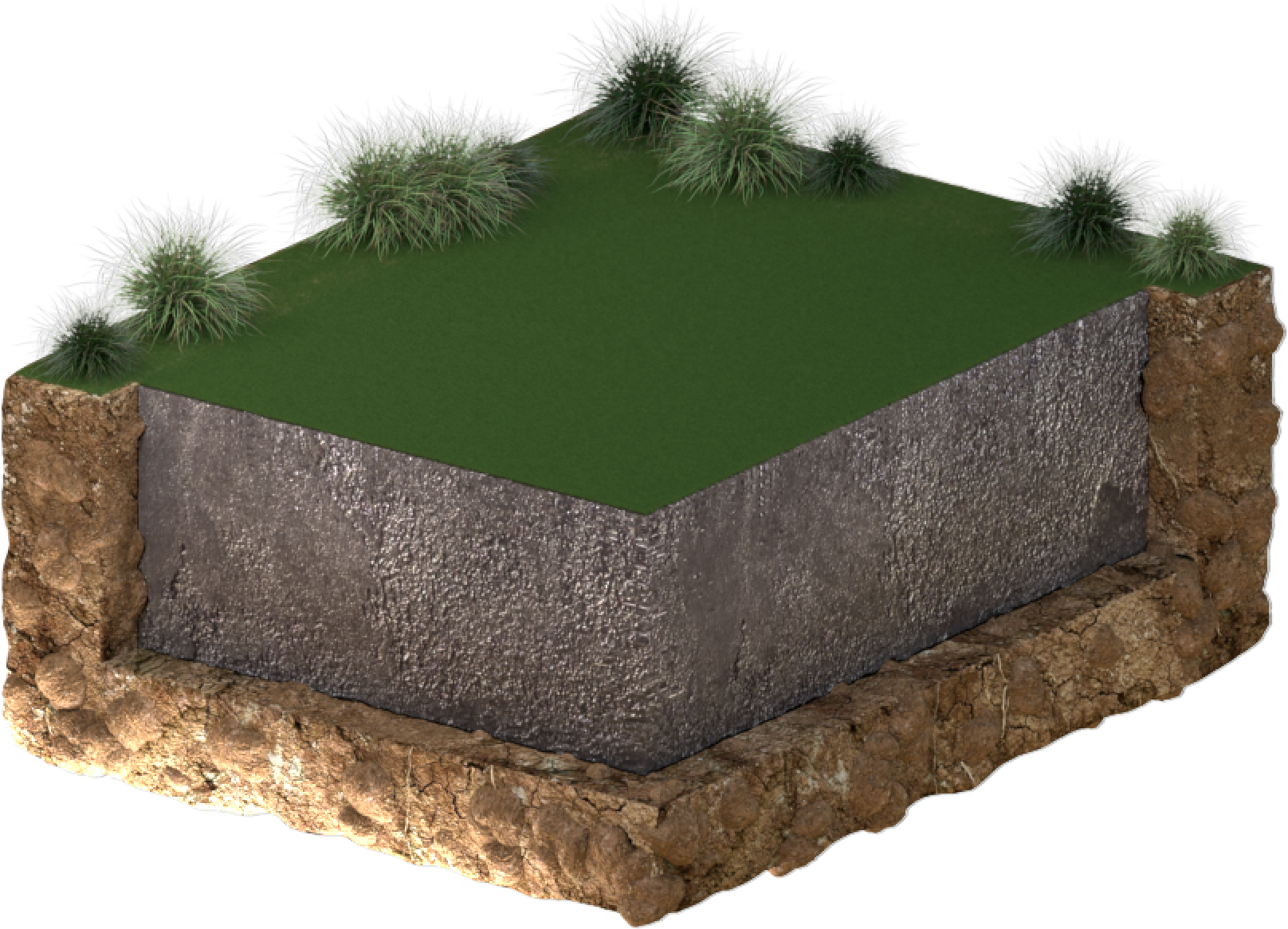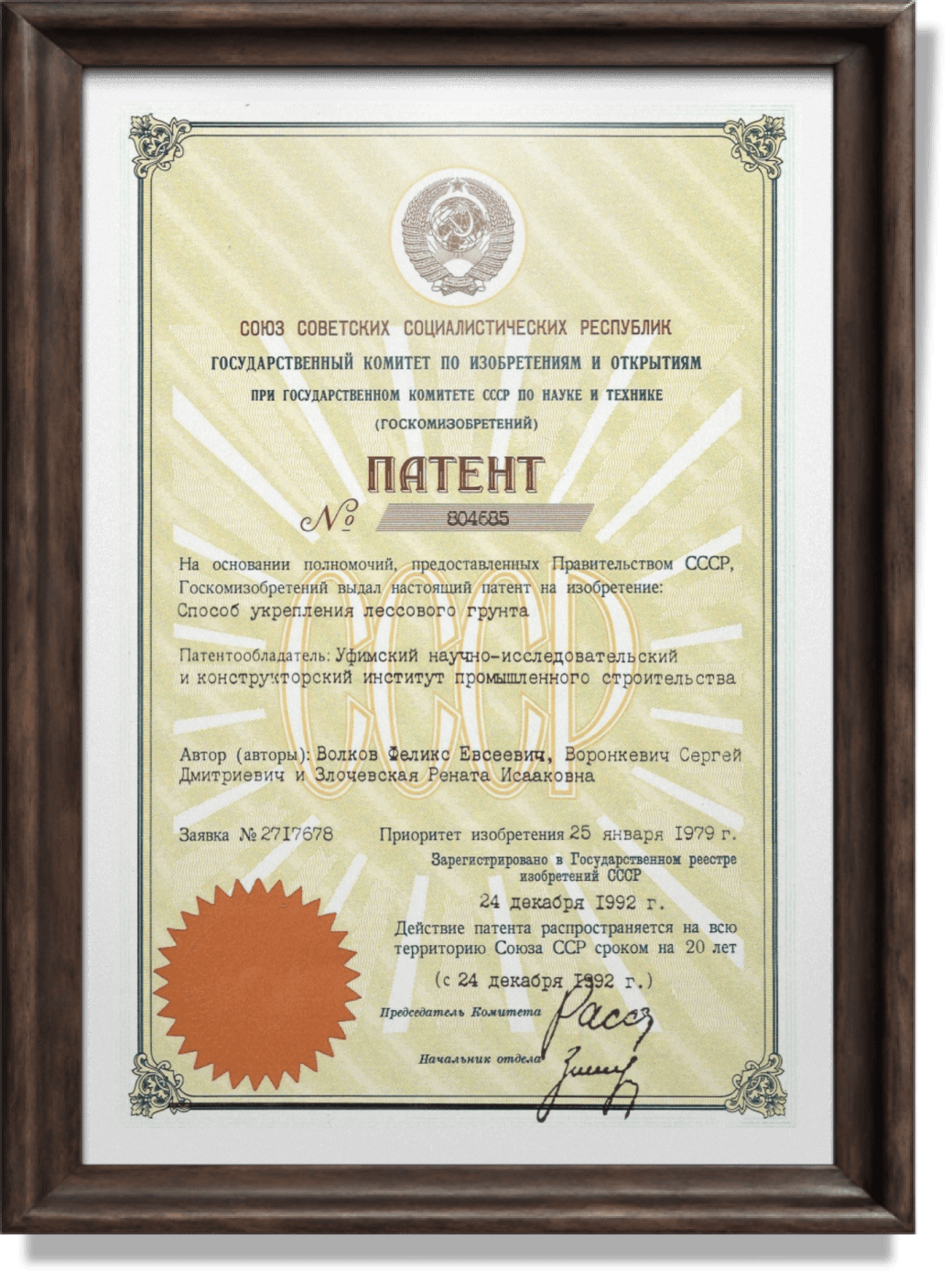Alkalization
Soil reinforcement
Improves soil prone to deformation under external loads and water infiltration. Specifically, clay, anthrosol, loess and loam. This particular method helps to cut spending in agricultural, industrial, infrastructure and residential construction.
A
lkalization
stabilizes weak soil, so that it can support future building. Alkali solution is pumped into poor soil through a screw pile or perforated pipe. A chemical reaction with alkali changes soil composition and improves load-bearing capacity. It can turn weak clay into rocky soil ready for construction.
Alkalization can be used on soil that has no more than 5% organic matter. Including clay soil, soil weakened and polluted by mining, agricultural, industrial activity and soil damaged by water.
Alkaline soil stabilization saves 20–60 %
Alkali
Cement
Sodium silicate

Improvement cost per 1 m3
$ 173
$ 212
$ 266
Requirements
Protective equipment
Heavy machinery
Immediate pipe wash after removal
Restrictions
Organic matter in soil > 5%
Clay in soil on site
Loess in soil Sr > 0.75, K < 0.1 m/day
In some cases instead of stabilizing a pile foundation can be used. Piles "cut through" unstable soil until they reach a deeper solid layer. For foundations built on alkalized sites a pile 2–3 times shorter can be used, which cuts building expenses by 20–60%.






Improvement
Requirements
Restrictions
$ 173 / m3
$ 212 / m3
$ 266 / m3
Improvement
Requirements
Restrictions
Improvement
Requirements
Restrictions
Compatible with all foundation types


Screw pile foundation. Screw piles are used as both: injectors and parts of future foundation. Alkali solution exit holes are made near the helical plates, their precise placement depends on the structural load of the future building. Piles are installed on site and alkali solution is then pumped through. The solution surrounds the screw plates targeting only the load-bearing area of soil.
After a month the modified soil is tested for density and stability.
Strip, slab, post and driven pile foundations. Whole length perforated single helix screw piles or metal pipes are used to improve a bigger area of problematic soil. The alkali solution seeps into the soil around the pile, stabilizing the whole area, unlike the local targeting of screw pile foundation. Piles can be removed or left in place if they don’t interfere with future construction.
One month is sufficient to stabilize a sizable area of soil.
Method efficiency proved
In Russia alkalization was studied by Felix Evseevich Volkov, PhD in geology and mineral deposits, head of the Scientific Research and Engineering Institute in Bashkortostan. He was also a member of the Russian Geotechnics, Foundation Design and Soil Research Society. He popularized the method in 1970—1980s, proving its efficiency, permanent effect and ultimately registered patents. Whilst studying at Moscow State University Volkov submitted his PhD thesis on alkalization, his works continue to be referenced to this day.
For popularizing alkalization, E. V. Volkov was decorated with “Inventor of the USSR” and “Honored constructor of the Republic of Bashkortostan” honorary titles. Together with his colleagues he stabilized and improved terrain across Russia for educational, scientific and healthcare establishments, churches, airports and multiple-occupancy residential buildings.
Felix Evseevich Volkov proved alkalization to be effective

"GlavFundament" — a well established company
Since 2010 "GlavFundament" has been designing, producing and installing screw piles and running soil analysis. Their clients include "Kerama Marazzi", "Gazprom", "Novatech", "RZD", "Rosneft" and The Ministry of Internal Affairs of the Russian Federation.
"GlavFundament" has a designated scientific and construction research department. Department specialists develop new pile types and stabilize soil. The Head of department is Anton Glazachev, technical sciences PhD, who worked directly with F. E. Volkov.
3D sign in Krasnoyarsk
Solar power station in Orenburg Oblast
Since
2010
Commercial greenhouse “Tolmachevskiy”
Weak soil on the construction site was measured to a depth of 10 m. The client was planning on using 11 meter piles at a diameter of 219 mm. After stabilizing the soil utilising the Alkalization method 3 meter foundation piles at a diameter of 108 —159 mm could be used, ultimately saving the client over 50% on building costs.
Discuss a project
Glazachev Anton Olegovich
We provide an any length warranty on the load-bearing capacity of alkalized soil.
To prepare a bespoke technical package we will need you to provide a geological construction site analysis. Including structural load and soil capacity data. We will then sign a contract and begin the process of Alkalization.
Name
Phone
Email
By submitting this form you consent to personal data processing
Message

Сообщение об успешной отправке!
Alkalization research in Russia
Волков Ф. Е., Рожнова Т. Н., Беляев В. П. Исследование укрепляемости лессовидных пород основания ВАЗа защелачиванием // Механика грунтов. — Уфа: 1986. — С. 65−77.
Волков Ф. Е., Злочевская Р. И., Воронкевич С. Д. О взаимодействии глинистых минералов с растворами щелочи // Вестн. МГУ. Сер. геол. — 1976. — № 3. — С. 87−95.
1
Волков Ф. Е. Изменение состава и физико-механических свойств глинистых грунтов в результате взаимодействия с растворами щелочи (гидроокиси натрия). — Автореф. дисс. канд. геол.- мин. наук. —М.: МГУ, 1977. — 24 с.
2
Волков Ф. Е. Влияние растворов гидроокиси натрия на инженерно-геологические свойства глинистых грунтов: Тр. НИИпромстроя. — Выпуск 21. — Уфа: 1977. — С. 112–119.
3
7
Волков Ф. Е., Злочевская Р. И., Воронкевич С. Д. Влияние растворов щелочи высоких концентраций на деформационные и прочностные свойства полиминеральных глинистых грунтов // Изменение геологической среды под влиянием деятельности человека. — М.: Наука, 1982. — С. 9–13.
4
Злочевская Р. И., Волков Ф. Е., Воронкевич С. Д., Дивисилова В. И. Закрепление глинистых и лессовых грунтов концентрированными растворами щелочи // Вопросы инженерной геологии и грунтоведения. — М.: Изд-во МГУ, 1983. — Вып. 5. — С. 384−397.
5
Волков Ф. Е., Злочевская Р. И., Воронкевич С. Д., Дивисилова В. И. Новый химический способ борьбы с деформациями лессовых пород // Инженерно-геологические процессы, явление и охрана среды лессовых территорий. — Ташкент: ФАН, 1985. — С. 24−29.
6
Брилинг И. А., Злочевская Р. И., Волков Ф. Е., Дивисилова В. И., Макеева Т. Г. Оценка распространения щелочных растворов в глинистых породах // Инж. геология. — № 2. — С. 37−45.
8
Волков Ф. Е., Злочевская Р. И. Новый химический способ закрепления водонасыщенных лессовых и глинистых пород — «защелачивание» // Инж. геология. — 1988. — № 1. — С. 15−29.
9
Волков Ф. Е., Самарин Е. Н., Воронкевич С. Д. Новый способ закрепления слабых водонасыщенных и просадочных лессовых пород (Ca-Na) щелочными растворами // Инженерная геология лессовых пород. — Ростов-н/Д.: 1989. — Т. II. — С. 64−66.
10
Злочевская Р. И., Волков Ф. Е., Макеева Т. Г., Самарин Е. Н., Шлыков В. Г., Плюснина И. И., Кривошеева З. А., Филимонова Т. С. Взаимодействие глинистых и лессовых пород с концентрированными щелочными растворами. Часть I. Химическое преобразование состава пород // Инж. геология. — 1990. — № 2. — С. 33−51.
11
Волков Ф. Е., Пискунов А. Н. Укрепление водонасыщенного лессовидного суглинка основания строящегося жилого здания защелачиванием // Усиление оснований и фундаментов существующих зданий: Тр. Уфимского НИИпромстроя. — Уфа: 1990. — С. 66−78.
12
Волков Ф. Е., Пискунов А. Н. Повышение несущей способности глинистого основания зданий защелачиванием // Усиление оснований и фундаментов существующих зданий: Тр. Уфимского НИИпромстроя. — Уфа: 1990. — С. 82−94.
13
Волков Ф. Е., Гера Л. Н. Опыт усиления лессового основания памятника архитектуры защелачиванием // Инженерно-геологические проблемы урбаназированных территорий / Мат. Международного симпозиума. — Екатеринбург: Аква-Пресс, 2001. — Т. II. — С. 715−722.
14
Волков Ф. Е., Гера Л. Н. Улучшение свойств водонасыщенных лессовых пород оснований зданий и сооружений защелачиванием // Реконструкция исторических городов и геотехническое строительство / Тр. Междунар. конф. по геотехнике. — Санкт-Петербург — Москва: АСВ, 2003. — Т. 2. — С. 55−59.
15
Макеева Т. Г., Злочевская Р. И., Волков Ф. Е., Ланицкий С. А., Алекеенко Г. П., Трофимов В. А. Особенности фильтрации и динамической сорбции щелочных растворов в глинистых грунтах // Геоэкология. — 1994. — № 2. — С. 85−103.
16
Волков Ф. Е. Роль растворов едкой щелочи в процессе формирования микроструктуры грунтобетона // Строительные материалы. — 2003. — № 10. — С. 44−46.
17
Волков Ф. Е., Пискунов А. Н. Укрепление водонасыщенных лессовых пород оснований аварийных зданий защелачиванием // Тр. V Междунар. конф. по проблемам свайного фундаментостроения. — М.: 1996. — Т. II. — С. 137−140.
18
Волков Ф. Е., Пискунов А. Н. Усиление глинистых пород оснований аварийных зданий инъекцией раствора щелочи //Тр. VI Междунар. конф. по проблемам свайного фундаментостроения. — М.: 1998. — С. 22−26.
19
Volkov F. E., Gera L. N. Building Engineering on a clay base stabilized with alkalizing // 6th International Conference on Jround Improvement Technidues, 18−19 July 2005, Coimbra, Portugal. — P. 605−609.
20
Volkov F. E., Voronkevitch S. D, Zlochevskaya R. J. Improvement of building properties of water-saturated loess and clay soils with alkalizing // Proceedings Sixth International Congress International Association of Engineering Geology (6−10 August 1990, Amsterdam, Netherlands). — Balkema (Rotterdam): 1990. — P. 2051−2054.
21
Volkov F. E., Piskunov A. N. Strengthening of foundations on loessial soil with alkalization // Proceedings Eighth International Congress International Association for Engineering Geology and the Environment (21−25 September 1998, Vancouver, Canada). — A. A. Balkema (Rotterdam): 1998. — P. 3435−3437.
22
Gera L. N., Volkov F. E. The influence of the alkaline-earth metal cations on loessial soil strengthening // Proceedings Eighth International Congress International Association for Engineering Geology and the Environment (21−25 September 1998, Vancouver, Canada). — Balkema (Rotterdam): 1998. — P. 4359−4362.
23
Gera L. N., Volkov F. E. Effect of alkaline-earth metal cations on stabilization of loessial and clayey soil usingalkalizing // Coastal Geotechnical Engineering in Practice (Jokohama, Japan). — Balkema (Rotterdam): 2000. — P. 593−597.
24
Volkov F. E., Zlochevskaya R. J., Makeeva T. G., Divisilova V. L., Alkaline solutions sorption in clays and problems of surroundings // Proc. 7-th European Clay Conference. Dresden, Germany, August 26−29. 1991. — Greifswald: Ernst-Morizt-Arndt-Univtrsität. — V. 3. — P. 1139−1144.
25

